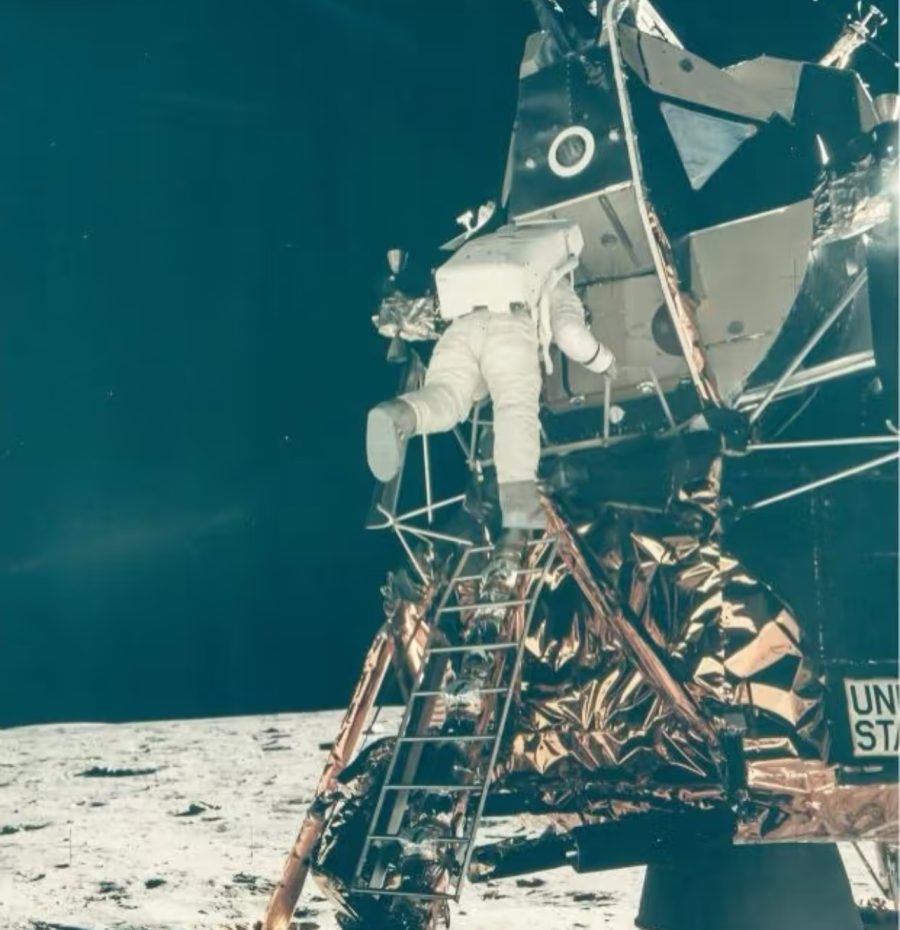In the field of media and communication, the concepts of encoding and decoding help us to understand how messages are created, disseminated, and interpreted. In this process, media producers encode certain information in a message in a specific way, and the audience interprets this information based on their own backgrounds, experiences, and perspectives. However, when encoding and decoding are biased, the message may not be conveyed as expected.

On July 20, 1969, American astronaut Neil Armstrong successfully landed on the moon, becoming the first person in history to set foot on the moon. This event was not only a great scientific breakthrough, but also spread rapidly around the world through the media of television, radio, and newspapers, and became an important political event during the Cold War. The U.S. government and NASA encoded the moon landing as a symbol of U.S. technological prowess through an elaborate media campaign.
So how do we understand the coding of the Apollo 11 propaganda? The successful moon landing was undoubtedly of great significance for both the United States and the world. First of all, from a national level, the successful moon landing was publicized by the media as a sign that the United States was a world leader in technology, which became an achievement that could justify the United States surpassing the Soviet Union during the Cold War, which was very important for a country at a critical time and emphasized the dominance of the United States in the field of space exploration. In terms of global significance, the success of the Apollo 11 moon landing marked an epochal breakthrough in mankind’s path of cosmic exploration and was coded by the United States Government and the media as a common victory for all mankind. The media also continued to emphasize in various national reports that it was a transnational achievement and not just a U.S. achievement.
Hall’s model emphasizes three ways of interpreting information that exists in the transmission of information Firstly, the Dominant-Hegemonic Position, the audience fully accepts the message encoded in a way that is consistent with the creator’s intent. Secondly, Negotiated Position, the viewer partially accepts the encoded content, but adjusts it to incorporate his or her own point of view. Thirdly, in Oppositional Position, the viewer directly opposes the creator’s intent, decoding a meaning that is the exact opposite of what was encoded.
The dominant decoding mainly came from the American public and media, who viewed the event as a remarkable achievement for the country. They saw it not only as a technological breakthrough for the United States but also as a demonstration of American freedom, confidence, and the superiority of its democratic system. On the other hand, the oppositional decoding primarily came from the Soviet Union and other countries in opposition to the United States, who questioned the event. Soviet media repeatedly emphasized the political motives behind the event, suggesting that the U.S. used the moon landing to further consolidate its global hegemonic position, portraying it as a symbol of imperialism. Of course, there was also a negotiated position, mainly from developing countries. In the media of these nations, the Apollo 11 moon landing was partly seen as progress in human technology, while some countries believed in conspiracy theories about the moon landing and tried to find photographic evidence to claim that the landing was faked and filmed in a studio. However, regardless of their viewpoints, the media in these countries did not concern themselves with the true motives behind the event.

As to why there is a difference between encoding and decoding is because different cultural backgrounds, different political ideologies and different degrees of emphasis on scientific and technological development in different regions play a key role in interpreting information. Through this case, we can see that intercultural communication between different regions is particularly important in today’s deepening globalization. The encoding and decoding of information is always affecting the response and understanding of audiences in different parts of the world, and we should more actively promote cross-cultural communication and pay attention to the power of information dissemination.
references
- Hall, Stuart (1980). Encoding/Decoding. In Culture, Media, Language. London: Routledge.
2. Fiske, John (1987). Television Culture. Routledge.
3. McQuail, Denis (2010). McQuailÔÇÖs Mass Communication Theory. Sage Publications.
4. ÔÇťThe Apollo 11 Mission: 50th Anniversary,ÔÇŁ NASA.


Hello Qianyi, you analyzed a very controversial and discussed topic in modern history. I like this topic very much. In your article, you first explained the definition of HallÔÇÖs model and linked them to the Cold War, which was the largest propaganda war in human history. You analyzed the application of encoding and decoding from the perspective of American media and Soviet media respectively, showing readers the real application of theory in reality. I think maybe you can add some comments from later historians on this period, which may make it easier for readers to understand your blog.
This is a fascinating perspective on the Apollo 11 moon landing, particularly with the focus on how it was “decoded” differently around the world. I really liked how you highlighted the role of media in shaping the global perception of the event, and how cultural and political contexts influenced the way it was understood. The comparison between media coverage in different countries adds depth to the discussion.
It would be interesting to explore how advancements in media technologyÔÇöfrom radio to TVÔÇöaffected the global reception of such landmark events. Overall, this post really made me rethink the moon landing as not just a scientific achievement but a major media event with lasting cultural impact.